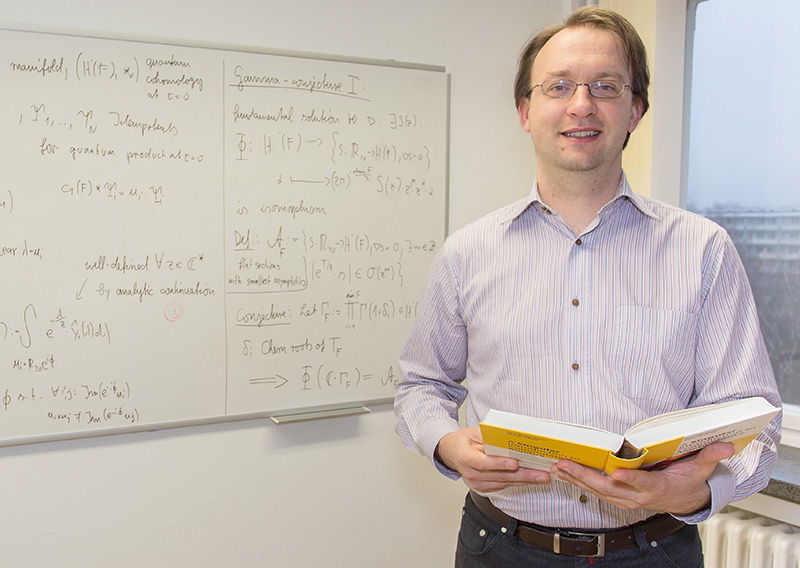Algebraic approaches to problems coming from theoretical physics
Eleven questions for Prof. Dr. Christian Sevenheck, Professor of Algebra since June 2014
-

Prof. Dr. Christian Sevenheck wants "to teach students to appreciate the the interplay of the many areas of mathematics". Photo: Steve Conrad
Prof. Dr. Christian Sevenheck (40) holds the Professorship in Algebra at the Faculty of Mathematics since June 2014. In eleven answers he gives the readers of “University News“ an insight into his career, goals and time in Chemnitz.
What do we actually understand under “Algebra”?
Algebra is a part of Mathematics which tries to solve problems (e.g. those coming from geometry) by introducing very general abstract structures and studying their properties.
As an example it can be shown using algebraic methods that the squaring of the circle is impossible. The solution to this problem is in fact nearly 200 years old, but it has attracted attention of mathematicians since antiquity and is still a highlight in algebra lectures within the Mathematics curriculum.
TU Chemnitz is for me as a professor the right choice, because…
…it offers me is a very pleasant professional and personal environment. Moreover, there are plenty of possibilities to develop my research ideas at the Faculty of Mathematics during the next years.
Could you say a few words about your academic career?
I studied in Düsseldorf and in Nantes (France) and received my Ph.D. in Mainz. After a postdoctoral training in Paris, I obtained the habilitation in Mannheim and also worked there for several years as a Heisenberg Fellow of the German Research Foundation. Since June this year, I am now working here in Chemnitz.
Describe your study time in about 15 words.
this was the period of my life where I enjoyed the greatest freedom possible (I am not sure whether this would still be true today).
Did you have role models during your studies who encouraged you to pursue a scientific career?
Without any doubt, I have been much influenced by the supervisor of my doctoral thesis. It is not a coincidence that this person is usually called "Doktorvater" (doctoral ‘father’) in German.
What advice would you give young students and graduates?
Above all to remain curious and to follow their own path. Needless to say, one needs to be hard-working, especially in such subject as mathematics. But to be really successful, one also needs to learn and to practice a certain kind of independent thinking.
What would you like to achieve in the teaching for the future?
Since my research uses methods from many different fields of mathematics, I would like to contribute to the teaching profile of the faculty in a broad sense. I would like to teach students to appreciate the the interplay of the many areas of mathematics.
Which impact do you make in the research at TU Chemnitz?
I am particularly interested in algebraic approaches to problems coming from theoretical physics, especially from string theory. So, it is ultimately about such fundamental questions as the origin of our universe. There has been extremely exciting developments in that area over the past 20 years, this has yield solutions to problems in geometry that were open since antiquity.
There are around 45,000 professors at German universities. What sets you apart from others?
I have not had yet had the opportunity to study the CVs and research profiles of my 45,000 colleagues. Hence I cannot say much to this issue.
Which place do you show your guests the most in Chemnitz?
Actually, I find Theatherplatz very nice, which is the first thing to see by arriving at the railway station. Otherwise, Kaßberg is worth seeing and a trip to Wasserschloß Klaffenbach is always highly recommended.
How do you play a part in the life of the city?
The Faculty of Mathematics has a good tradition to develop activities in cooperation with schools, to awaken the interest of children in mathematics at an early stage. I would like to play a part in it during the next few years.
Further information about the professorship at: https://www.tu-chemnitz.de/mathematik/algebra/
Katharina Thehos
25.11.2014





